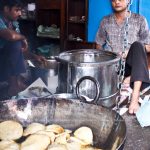Memories of Hazratganj
Reminiscing the Good Old Days
“Tasawwuraat Ki Parchhaiya’n Ubharti Hai’n,
Kabhi Gumaan Ki Soorat Kabhi Yaqee’n Ki Tarah”
Sahir Ludhianvi
For us Lakhnavis, Hazratganj was, what Oxford street was to Londoners and Champs Élysées (Sha(n) zay Lizay) to Parisiens. An aimless stroll in Hazratganj generally known as “Ganjing” was one of the favourite pastimes of the young and the restless. But the place catered to all ages, interests, tastes and suited all pockets with a variety of shops, cinema halls, and restaurants, some of them could be recounted as:
The Indian Coffee House: Indian Coffee Houses were registered societies where share holders were waiters as well. The relationship between the customers and the waiters at Hazratganj Coffee House was of warmth and respect. The Coffee House, a relatively cheaper eatery in Hazratganj, was not just a place for coffee and snacks but it was a hub of activity for intellectual elite from all walks of life: The poets, writers, journalists, politicians, lawyers and social workers as well as students. All gathered there regularly for a free exchange of ideas and often heated discussions on current issues took place. The prominent visitors were: Josh Malihabadi, Asrar-ul Haq Majaz, Ale Ahmad Suroor, Anand Narain Mulla, Hayatullah Ansari, Yash Pal, Sajjad Zaheer, Amrit Lal Nagar, Dr. Mohammad Hassan, Satish Batra, Salam Machlishehri, Kali Prashad, S.M.Jaffar, Ansar Harvani, Feroze Gandhi, Sharib Rudaulvi, Abid Suhail, Iqbal Majeed, Arif Naqvi and many more.
Kwality’s Restaurant: Kwality’s was a modern meeting place for the coffee- sippers as well as for gourmands. The Cold coffee and Mutton chops with a bone ticking out, were all time favourites but expensive. So we could afford them with our ‘Eedi’ and ‘Baqreedi’ incomes only.
Chowdhri’s Chaat House: An excellent place for sharper taste buds which I certainly had in my teens. Luckily, a classmate, Pushpa Massand’s family was co-owner of the restaurant and on special occasions, she gave us a treat. Unfortunate for us, she married young and left Lucknow.
Chinese Restaurant: There was only one in Hazratganj as authentic Chinese food was not very palatable for the addicts of very rich Lakhnawi cuisine. In our vagabond’s life, when we reached Toronto, Canada, after many years, I learned that there was a Chinese restaurant where the owner spoke chaste Urdu. He was brought up in Lucknow where his family had a Chinese restaurant in Hazratganj. How small the world has become!
Cinema Halls: Basant and Prince cinema halls showed Indian films and Capitol and Mayfair, mostly English films. When the film Anarkali was released and we sisters were anxious to see it, our grandmother who had read Imtiaz Ali Taj’s book, also showed an interest in it. So we all went to see it in Hazratganj. The film was very long, especially the last scene in which Anarkali was being encaged within a brick wall and a never-ending song; “Aye Mohabbat Tu Zinda baad” was still going on when the bricks had reached Anarkali’s neck and there was pin drop silence in the hall except the sound of sighs and moans. In these serene and crucial moments, our grandma suddenly let out loud: “Mui chunee bhi ja chukey, meri Namaz qazaa ho rahi hai,” (why this soul is not encaged quickly, my prayers time is running out), there was a burst of laughter in the Hall as well as some bitter complains; “Saara mazaa kirkira ker diya Bari Bi ne” (old-lady has spoiled all the suspense) and we sisters could dig our graves right there. For some time, we had no courage to go to Hazratganj.
Gupta Studio: It was a very popular studio for photography enthusiasts. Our family and friends were Gupta’s biggest customers as we always had prints to be made and group photographs to be taken on occasions. He was warm and friendly and became like a relative to us. We gradually started using his studio like our “Khala ka Ghar” (aunt’s house), taking the liberty of dumping our shopping bags and umbrellas there which we did not want to lug around. He remained tolerant and patient.
Book Shops: The British and the Universal sold all kinds of books but mainly school books, whereas Ram Advani’s catered to “Cerebrals” only. Sometimes, I posed as one and went in only to browse. A very kind looking gentleman-shopkeeper welcomed with a smile.
There used to be a special event in the evenings, especially Saturday evening in Hazratganj known as ‘Bird-Watching’. Flocks of colourful ‘Birds’ used to descend on Hazratganj and hordes of “Bird- Watchers” used to gather to feast their eyes.
An uncle, a passionate bird-watcher defended his passion by quoting his favourite poet Majaz:
“Ishq Ka Zauq-e Nazara Muft Mein Badnaam Hai,
Husn Khud Betaab Hai Jalvey Dikhane Ke Liye”
Leaving for his “Daily beat”, if uncle was asked where he was going again, he always gave a very honest answer: “Hazratganj ki ziarat (pilgrimage) karney.” One day, a new maid in the house heard him say that and thought Hazrat “Gunj” was also a Sufi saint like Hazrat Nizamuddin Aulia and Hazrat Moinuddin Chishti whose shrines she had not been able to go for ziarat. So she requested him: “Bhaiyya, mujhey bhi Hazrat ‘Gunj’ ki ziarat ke liye saath le chaliye” (Sir, can u take me alone for this pilgrimage).
As luck would have it, this inseparable soul from Hazratganj had to migrate to a far off country which was considered a “Greener pasture” for young men like him. He felt like being exiled to “Kaala Paani” without committing any crime. For long, he felt like a “Mahi-e-bay aab” (A fish without water) away from his favourite haunt. While departing, he promised his friends to visit them every year in his favourite months, November or February, the months of “Gulabi Jaarey” (pleasant mild winter). But where there is a will, there isn’t always a way and due to some unforeseen and tragic circumstances of his life, he could not keep his promise. However, time and distance could not extinguish the flame of his love for Lucknow, Hazratganj and his friends. Luckily, His son was always aware of his father’s heart’s desire and had been saving money for his father’s comfortable trip to Lucknow as a gift for his 75th birthday. So he came to Lucknow after more than half a century. There was no airport in his time in Lucknow so he did not see anything familiar on arrival which disappointed him. Bringing him home, we purposely avoided driving through Hazratganj and told him that he should visit his favourite place in the morning when he would be able to see better. He felt offended at that and protested by quoting Ghalib: “Go haath mein jumbish nahin aankhon mein tu dam hai“. But we did not oblige him and insisted he needed rest after a long journey from California.
Next morning, we took him to Hazratganj, via Secretariat which he recognized and found not much changed, but when the car took a turn for the main road of Hazratganj, he asked “Why have you brought me to this dirty place, take me to Hazratganj straight“. He refused to believe that we were driving just there. We drove slowly forward and when he saw “Capoor’s” written with “C” he was finally convinced that the dirty place was indeed the modern Hazratganj.
He was still exhausted after the long journey so he said “Let’s go and have coffee at Kwality’s to relax.” I had to gather courage to tell him that Kwality’s was no more. “What?” He almost screamed. “Then where do modern people go for coffee?” He asked. “At Barista” I answered. “Barasta“, kya betuka naam hai (what kind of name is that) ? Kwality’s had quality in the name even. Anyway, let’s go and see this funny place. But when we reached there, we found a long queue even to enter. He refused to stand in a queue and reminisced his old days when he never queued up for a place as his favourite waiter, Shambhoo at Kwality’s always found a table for him immediately.
He must have been feeling hungry as he had no appetite at breakfast time, so he suggested that we go to Ranjana which used to have coffee as well as a light noodle dish which he liked. Now I didn’t know how to break the news to him that Ranjana was also no more. But I did it somehow. He looked very sad and asked what happened to Ranjana. I was barely able to utter but I had to that Barista was where Ranjana used to be. Uncle was very light skinned and literally turned red in his face with anger to hear this and asked me to return home. But luckily I thought of a place from his vintage which was still there and not much changed. I drew his attention towards Chowdhry’s Chaat. He casually glanced at it, didn’t look excited at all and said, he could not digest that fiery stuff anymore. I avoided mentioning the Coffee House which I knew had deteriorated a lot and was going to disappoint him. Like a beaten team with long faces, we returned home. To change the moods, I brewed a delicious Colombian coffee for all of us and reminded uncle that “Distant grass isn’t always greener” just as the “Greener pastures” he had left for more than fifty years ago, were not as green as they were thought of.
Dr. Sehba Ali
Writer is from Rudauli. An expert in Linguistics with passion of Urdu language
(Published in The Lucknow Observer, Volume 1 Issue 9, Dated 05 December 2015)




